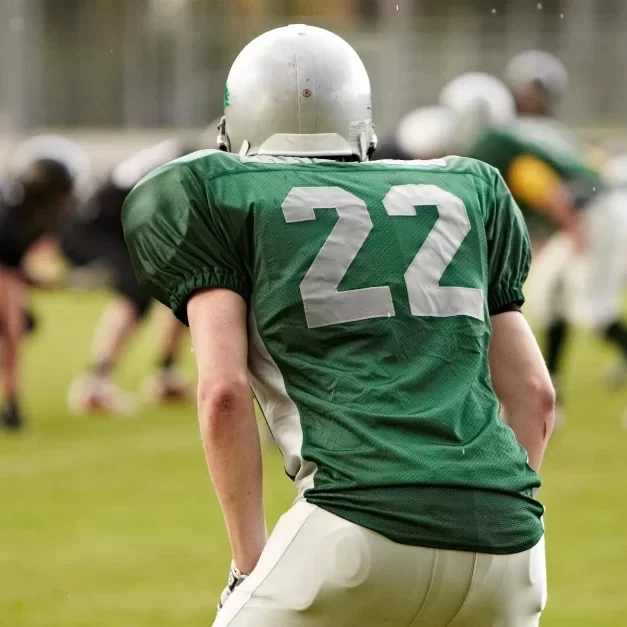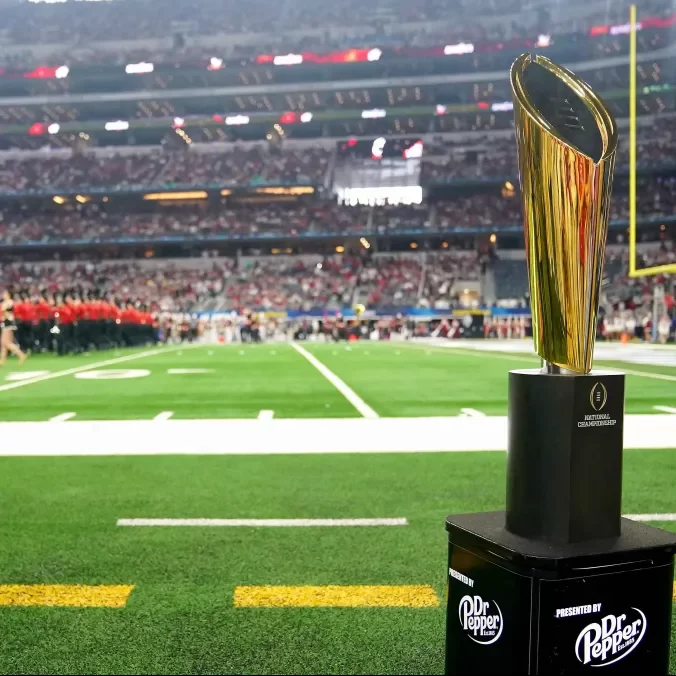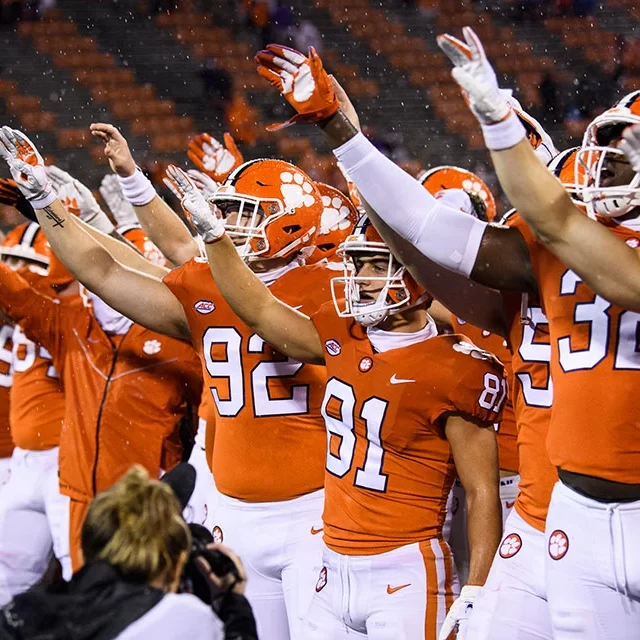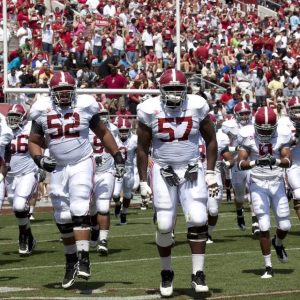College Football Championship Overview
As fans and teams gear up for the big game, understanding when the college football championship occurs is crucial. This event captures the attention of millions, marking the climax of a season filled with intense competition and hard-fought battles on the gridiron.

The Importance of Timing in College Sports
Timing is everything in college sports, especially when it comes to championships. “What time is college football championship” isn’t just a question of the hour; it touches on the peak of seasonal play, academic schedules, and fan plans. The date and time can affect team readiness, broadcasting reach, and audience engagement. Coordinating the perfect slot for this pivotal game involves a sophisticated balance, ensuring that players are at their peak and fans are available to cheer them on.
Key Factors Influencing Championship Scheduling
Navigating through the maze of scheduling the college football championship involves considering several key factors. Each plays a critical role in the decision-making process. These factors aim to ensure the game is accessible, enjoyable, and fair to all involved.
Venue Availability
When debating what time the college football championship should be, venue availability stands out. The ideal location must align with the event’s prestige. It needs to be available on the selected date and equipped to handle the influx of fans. Stadiums with a history of hosting large events tend to be in high demand, and securing one involves advanced planning.
TV Broadcasting Slots
Television broadcasting slots are equally vital. The right time slot ensures maximum viewership and ad revenue. Networks and organizers work together to identify prime times that suit various time zones. They must avoid clashes with other major broadcasts to capture the largest audience possible.
Player Logistics
Finally, player logistics are crucial. Teams need time to rest, train, and study for the championship. They must account for travel time and acclimatization, especially if coming from a different climate. Balancing athletic commitments with academic responsibilities is a challenge that cannot be overlooked. By carefully considering these aspects, the championship can run smoothly for all participants.
Organizers weave these threads together to determine what time the college football championship should unfold. With full stands, tuned-in viewers, and well-prepared players, the stage is set for an unforgettable clash.
Historical Championship Game Dates
Looking back at historical championship game dates, patterns emerge. Consistency is key for fans and teams alike,
Trends in Scheduling Over the Years
Over the years, the scheduling of the college football championship has followed certain trends. Organizers often select the first or second Monday in January. This timing follows the conclusion of the bowl games. It allows students and fans to return to campus after the winter break. Regular scheduling aids in creating traditions and annual expectations among fans.
Trends also show avoidance of major holidays where viewership might drop. Organizers prefer dates that don’t clash with professional sports events. This careful planning maximizes attention and attendance. The trend reflects a delicate balance. It accounts for academic calendars, player health, and optimal TV slots.
In recent years, we’ve seen a shift towards evening kickoffs. This change aims to catch prime time audiences across different time zones. It maximizes exposure and accommodates various schedules. As live streaming becomes more popular, future scheduling may further evolve to fit global audiences.
 How Scheduling Affects Teams and Fans
How Scheduling Affects Teams and Fans
Understanding ‘what time is college football championship’ is vital for those involved. The date and time can significantly impact teams and their supporters.
Preparing for the Big Game
The lead-up to the championship is intense. Teams have little time. They must hone strategies, study rivals, and foster team spirit. A scheduled date gives teams a target. They plan their training and rest around it. Fans also mark the date early. They arrange viewing parties and gear up to support their teams.
For players, a fixed championship time aids their academic life. They balance sports and studies better. Coaches too plan their tactics based on the known schedule.
Travel and Accommodation Challenges
Teams and fans face travel issues. If not local, they must find flights and rooms. Popular events surge prices and demand. Early dates ensure better planning and lower costs. Securing safe and convenient lodging is key for fans and family traveling.
Students often have limited budgets. They need affordable options to join the championship excitement. Scheduling impacts the costs for all. It can make the difference between a full stadium and empty seats.
The ‘when’ of the college football championship shapes more than the game day. It influences preparation, travel, and cost for countless people. Timely scheduling ensures a memorable experience for fans and peak performance from teams.
Championship Game Predictions for Upcoming Seasons
With the understanding of how ‘what time is college football championship’ impacts the sport, we can delve into predictions for upcoming seasons. The key is to examine the traditional and recent trends, venue considerations, and TV slot preferences to anticipate future dates.
Analyzing Potential Dates
Predicting potential dates for the college football championship challenges even seasoned analysts. However, historical trends suggest sticking close to the first two Mondays in January. We might expect similar timing in upcoming seasons, balancing the academic and seasonal festivities.
To anticipate the ‘when’ for future championships, we consider these points:
- Post-Bowl Game Buffer: Championships typically follow bowl games, offering a pause for players and fans to regroup.
- Academic Schedules: The date is likely set post-winter break, minimizing academic disruptions.
- TV Prime Time: Evening kickoffs have become the norm, targeting prime time slots for widespread viewership.
- Fan Input: As fan-driven initiatives grow, their preferences on scheduling could influence future dates.
Anticipating exact dates involves accounting for network negotiations and venue bookings, complex tasks with many stakeholders. Yet, the focus remains: setting a time that benefits teams, fans, and broadcasters alike.
In upcoming seasons, barring unforeseen changes, we may expect college football championship games to continue in this established window. The exact time should harmonize competition heat with viewer convenience, making every championship memorable.
Planning the college football championship requires careful consideration of other events. Conflicts can lead to lower viewership and diminished fan experiences.
Coordination with Professional Sports Leagues
Organizers must work closely with professional sports leagues. They aim to avoid schedule overlaps that confuse fans or force them to choose between events. This is tricky, as major sports often have games throughout the year. Organizers look for gaps in the pro sports calendar to schedule the championship.
Evaluating the pro sports schedule helps predict the best time for the college football championship. This helps keep the audience’s interest focused on college football’s biggest game.
Academic Calendars and Student Considerations
Students are the heart of college sports. Making sure the game does not clash with academic duties is a top priority. The championship is typically set when classes are not in session. This ensures students can participate, either as players or fans, without academic stress.
Organizers review the academic calendar for optimal game timing. This helps students manage their time for studies, rest, and game participation. The goal is a time slot that supports student involvement both on and off the field.
Future of Championship Game Scheduling
The college football championship’s scheduling is entering a new era. Addressing ‘what time is college football championship’ now includes modern considerations. We foresee two pivotal factors in shaping future schedules:
The role of Streaming Services
Streaming services are changing how viewers watch sports. For the college football championship, this means more flexibility in scheduling. Games can air outside traditional TV prime time, reaching wider audiences. Fans can stream the game live, no matter their time zone. This could lead to unconventional kickoff times to suit global viewers. This approach can increase viewership and fan engagement. There’s potential for interactive experiences during the stream too.
With this shift, organizers might explore new dates and times. They might also offer on-demand viewing options, so fans never miss a moment. Streaming services can bring the game to more devices and screens. This change will likely influence ‘when’ the game happens in future seasons.
Fan-Driven Scheduling Initiatives
Fans are getting a say in when the championship takes place. Social media and online surveys let fans voice their preferences. Organizers are listening and could adjust the schedule accordingly. This change means fans have more power to influence the ‘what time is college football championship’ question.
Fan input can help pick dates that avoid major conflicts like holidays or other events. This makes it easier for fans to attend or watch the game. It also boosts overall enthusiasm for the event. Organizers are exploring ways to include fan feedback in their scheduling process.
In summary, the future schedules of the college football championship will likely embrace digital trends and fan opinions. These developments aim to enhance the experience for everyone involved, from players to spectators.


